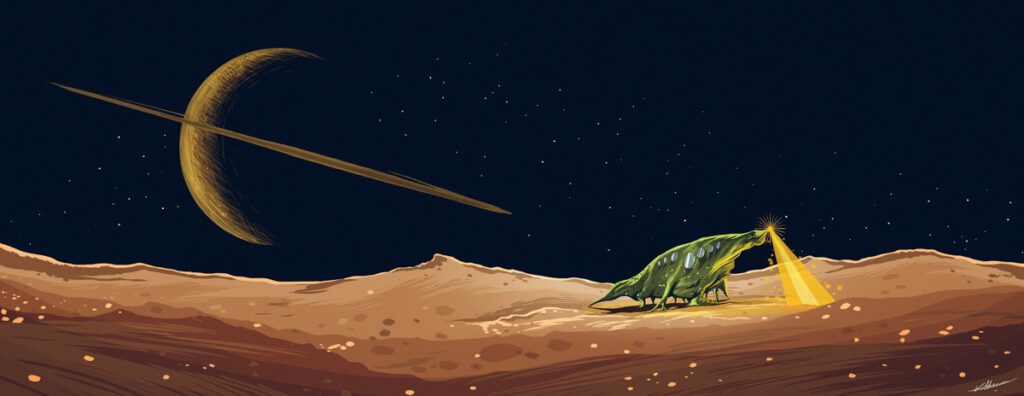Editor’s note: This is a continuation of a story Roger was working on when he passed away. This ending is one of many we received. To read Roger’s beginning to the story, from the end of which each entry picks up the thread, go here. Illustration by Krishna Bala Shenoi. This is one of five endings we’re posting this week. Vote on this week’s endings here.
Maurie Baker writes:
“That’s a beautiful sentiment, but seriously, we need to figure out what this really is,” Mason said. “How likely is it to be interference?”
“From what?” asked Elliot. “Extremely unlikely. No one would be broadcasting on this frequency, you know that.”
“Of course,” Regan interrupted, “but we are operating on an assumption that we are listening to a signal from extraterrestrial life.”
“Any possible counter explanation should be considered.”
“You should talk to someone in the music school,” Claire said. “Maybe they are experimenting with some avant-garde music and you’ve caught a whiff of it.”
“Ugh,” said Elliot, “that’s just silly. There’s no way this is terrestrial.”
“We need to be absolutely sure,” said Mason.
The waitress brought the crumb cake to Regan and she dug in. “Anyone else want anything?” she asked.
“I think we are going to need some beer,” Mason noted with a grin.
ON EARTH
The confirmation took months.
Mason worked tirelessly to gain the necessary proof. He often thought that there would be another explanation. But, as things became clearer, he realized what a momentous discovery they had made. The sounds were indeed from Titan and appeared to be from none other than a lifeform. Every attempt to attribute it to another phenomenon failed.
Communicating with and convincing government also took months. But finally Mason was standing before NASA and the President’s science adviser, with reams of data and undeniable proof. Life existed elsewhere. It was humbling.
The news took the US and the world by storm. Space programs that were dormant, or nearly so, sprang to life. It was another space race, but with a spirit of cooperation and wonder, instead of aggression and fear. We were not alone.
ON TITAN, long ago
The most apt definition would be Bystander. Those who watch but do not take part. In the early years of exploration they had discovered that to interfere was to contaminate, sometimes fatally. Entire planets had been lost. However, although theirs was an ancient and wise race, they were curious. They had developed starflight early in their history, to escape a harsh and forbidding home world and their desolate solar system. Exploration was part of their consciousness. But they had learned from many mistakes over countless millennia to only observe. When a race was ready to be linked it was clear—and then, and only then, would they be approached.
In the Bystanders’ language, the system was called Promise. It had been targeted early. So many planets, so many moons! It was clear that life would develop on the third planet from the sun, denoted PRM-3. Simulations had been in place for eons predicting not only life, but a high likelihood of intelligent life. And so it came to pass. Evolution took its own path on this planet, as it has done on each. But the environment made life easy, and the native species were almost too smart. Space exploration happened in fits and starts and just when it appeared that a leap forward would be made, focus was shifted. The Bystanders watched and waited.
The largest moon of planet PRM-6 also had a statistical likelihood of developing life. The probe sent by the lifeforms of PRM-3 was noted as well. An observation was scheduled to determine the scope and intent of the probe. Could this be the beginning of a growth period for PRM-3, ultimately leading to true space exploration and the start down the path off of the planet and into the universe?
As the Bystander’s ship touched down on the moon called Titan by those of Earth, a small miscalculation triggered a tremor. The quake rocked the surface, especially in the region of the probe. Luckily the result was only a small subsidence of the locale. Surely not enough to be sensed. Thus it was determined to carry on with the mission and the normal set of test scans were conducted. As expected by the simulations, a crude lifeform had developed. Without the lush atmosphere and temperate conditions of Earth, it would not ever achieve true intelligence. But the moon’s atmosphere and methane cycle allowed for life—and life was still beautiful, in all its forms. Perhaps someday, when those of Earth learned that life outside their planet was possible, it would spur their reach into the cosmos. What the Bystanders could not know—even in their seemingly infinite wisdom—was that it was their scans that were the tipping point. As the scanning lasers moved over Titan, the molecular lifeforms reacted in an unexpected way. They began to sing.
Note: In 2008, researchers at Kansas State captured “sounds” from molecules excited by laser pulses. The research is published in Physical Review Letters and summarized here: http://www.world-science.net/othernews/080206_molecule-sounds











